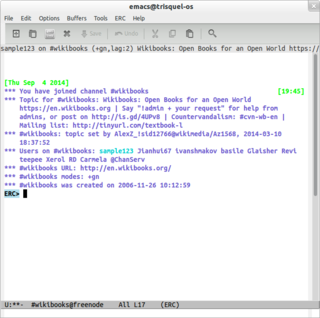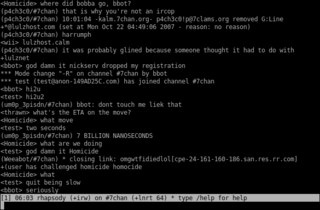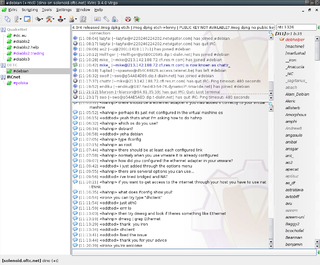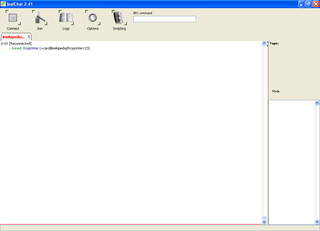
HexChat is an Internet Relay Chat client that is a fork of XChat. It has a choice of a tabbed document interface or tree interface, support for multiple servers, and numerous configuration options. Both command-line and graphical versions are available.

Irssi is an IRC client program for Linux, FreeBSD, macOS and Microsoft Windows. It was originally written by Timo Sirainen, and released under the terms of the GNU GPL-2.0-or-later in January 1999.

Internet Relay Chat (IRC) is a text-based chat system for instant messaging. IRC is designed for group communication in discussion forums, called channels, but also allows one-on-one communication via private messages as well as chat and data transfer, including file sharing.

Blackbox is a free and open-source stacking window manager for the X Window System.
Info-ZIP is a set of open-source software to handle ZIP archives. It has been in circulation since 1989. It consists of 4 separately-installable packages: the Zip and UnZip command-line utilities; and WiZ and MacZip, which are graphical user interfaces for archiving programs in Microsoft Windows and classic Mac OS, respectively.

SmallBASIC is a BASIC programming language dialect with interpreters released as free software under the GNU General Public License version 3 for Microsoft Windows, Linux and Android.
A BNC is a piece of software that is used to relay traffic and connections in computer networks, much like a proxy. Using a BNC allows a user to hide the original source of the user's connection, providing privacy as well as the ability to route traffic through a specific location. A BNC can also be used to hide the true target to which a user connects.

ERC is an Internet Relay Chat (IRC) client integrated into GNU Emacs. It is written in Emacs Lisp.
IRCX is an extension to the Internet Relay Chat protocol, developed by Microsoft.

JOE or Joe's Own Editor is an ncurses-based text editor for Unix systems, available under the GPL. It is designed to be easy to use.
The following tables compare general and technical information between a number of notable IRC client programs which have been discussed in independent, reliable prior published sources.

ZNC is an IRC network bouncer or BNC. It can detach the client from the actual IRC server, and also from selected channels. Multiple clients from different locations can connect to a single ZNC account simultaneously and therefore appear under the same nickname on IRC. It supports Transport Layer Security connections and IPv6.
The following tables compare general and technical information for a number of available applications supporting the eDonkey network.

ircII is a free, open-source Unix IRC and ICB client written in C. Initially released in the late 1980s, it is the oldest IRC client still maintained.

WeeChat is a free and open-source Internet Relay Chat client that is designed to be light and fast. It is released under the terms of the GNU GPL-3.0-or-later and has been developed since 2003.

Konversation is an Internet Relay Chat (IRC) client built on the KDE Platform and is free software released under the terms of the GNU GPL-2.0-or-later. Konversation is currently maintained in the KDE Extragear Network module, which means that it has its own release cycle which is independent from the main KDE applications. It is the default IRC client in many prominent Linux distributions, such as openSUSE, the KDE spin of Fedora, and Kubuntu.

Ayttm is a multi-protocol instant messaging client. It is the heir of the EveryBuddy project.

KVIrc is a graphical IRC client for Linux, Unix, Mac OS and Windows. The name is an acronym of K Visual IRC in which the K stands for a dependency to KDE, which became optional from version 2.0.0. The software is based on the Qt framework and its code is released under a modified GNU General Public License.

LeafChat is a free IRC client for Microsoft Windows and Unix-like operating systems, licensed under the GNU GPL-3.0-or-later. A donation is requested.

NanoLinux is an open source, free and very lightweight Linux distribution that requires only 14 MB of disk space including tiny versions of the most common desktop applications and several games. It is based on the Core version of the Tiny Core Linux distribution and uses Busybox, Nano-X instead of X.Org, FLTK 1.3.x as the default GUI toolkit, and SLWM. The included applications are mainly based on FLTK.













